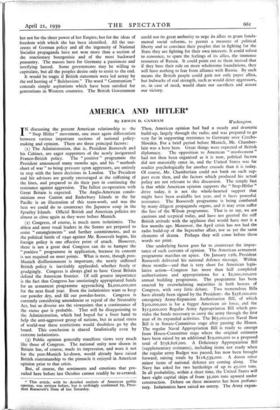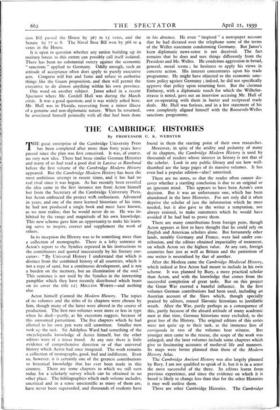AMERICA AND HITLER*
By ERWIN D. CANHAM
Washington.
IN discussing the present American relationship to the "Stop Hider" movement, one must again differentiate between various important sections of national policy- making and opinion. There are three principal factors: (t) The Administration, that is, President Roosevelt and his Cabinet, are eager supporters of the newly invigorated Franco-British policy. The " positive " programme the President announced many months ago, and his "methods short of war" to bring pressure upon aggressors, are entirely in step with the latest decisions in London. The President and his advisers are greatly encouraged at the stiffening of the lines, and prepared to 'do their part in continuing the resistance against aggression. The fullest co-operation with Great Britain is expected. The Anglo-American condo- minium over Canton and Enderbury Islands in the far Pacific is an illustration of this team-work, and was the best we could do to counteract the Japanese coup in the Spratley Islands. Official British and American policies are almost as close again as they were before Munich.
(2) Congress, of course, is much more isolationist. The ablest and most vocal leaders in the Senate are prepared to resist " entanglements " and further commitments, and as the political battle of 1940 against Mr. Roosevelt begins, his foreign policy is one effective point of attack. However, there is not a great deal Congress can do to hamper the " positive " programme in application, because its consent is not required on most points. What is more, though post- Munich disillusionment is important, the newly stiffened British policy is inevitably applauded, whether freely or grudgingly. Congress is always glad to have Great Britain defend the American frontier. Of still greater importance is the fact that Congress has unstintingly appropriated funds for an armament programme approaching $2,000,40040,000 for the next fiscal year. Even the isolationists want to keep our powder dry, and fill our powder-horns. Congress is currently considering amendment or repeal of the Neutrality Act, but so diverse are the viewpoints that a continuance of the status quo is probable. That will be disappointing to the Administration, which had hoped for a freer hand to help the anti-aggressor group of nations, but in actual stress of world-war these restrictions would doubtless go by the board. This conclusion is shared fatalistically even by extreme isolationists.
(3) Public opinion generally manifests views very much like those of Congress. The national unity now shown in Britain has, of course, made its impression, and were it not for the post-Munich let-down, would already have raised British statesmanship to the pinnacle it enjoyed in American opinion prior to that crisis. - But, of course, the sentiments and emotions that pre- vailed here before last October cannot readily be re-created.
* This article, with its detailed analysis of American public opinion, was written before, but is strikingly confirmed by, Presi- dent Roosevelt's Note of last Saturday.
Then, American opinion had had a steady and dramatic build-up, largely through the radio, and was prepared to go very far in supporting resistance to Germany over Czecho- Slovakia. For a brief period before Munich, Mr. Chamber- lain was a hero here. Great things were expected of British diplomacy. The opposition to American " involvement " had not then been organised as it is now, political factors did not materially enter in, and the United States was far readier psychologically for another crusade than it is today. Of course, Mr. Chamberlain could not bank on such sup- port even then, and the factors which produced his actual policy are not relevant to this discussion. The simple fact is that while American opinion supports the " Stop-Hitler " drive today, it is not the whole-hearted support that might have been availatle last year, and it faces powerful resistance. The Roosevelt programme is being combated by many diligent propaganda organs, and it may even suffer the fate of the Wilson programme. That is to say, we are cautious and sceptical today, and have not greeted the stiff British attitude with the applause that would have met it a few months ago. Moreover, the April crisis has not had the radio build-up of the September affair, nor as yet the same elements of drama. Perhaps they will come before these words see print.
One underlying factor goes far to counteract the impor- tance of such currents of opinion. The American armament programme marches on apace. On January 12th, President Roosevelt delivered his national defence message. Within three months—and that is very short for American legis- lative action—Congress has more than half completed authorisations and appropriations for a $2,000,000,000 annual building programme. The programme has been enacted by overwhelming majorities in both houses of Congress, with very little debate. Two tremendous Bills have already been signed by the President : the $358,000,000 emergency Army-Expansion Authorisation Bill, of which $300,0coop00 is for a bigger American air force, and the $513,000,000 Regular Army Appropriation Bill which pro- vides the funds necessary to carry the army through the first year of its expanded activities. The $65,000,000 Naval Base Bill is in Senate-Committee stage after passing the House. The regular Naval Appropriation Bill is ready to emerge from House-Committee stage where the original estimates have been raised by an additional $19,000,000 to a proposed total of $758,808,000. A Deficiency Appropriation Bill (supplementary estimates), including items not ready when the regular army Budget was passed, has now been brought forward, raising totals by $116,539,000. A dozen other minor items of national defence are coming along. The Navy has asked for two battleships of up to 45,000 tons. In all probability, within a short time, the United States will have eight capital ships of from 35,000 tons upward under construction. Debate on these measures has been perfunc- tory. Isolationists have raised no outcry. The Army expan- sion Bill passed the House by 367 to 15 votes, and the Senate by 77 tc 8. The Naval Base Bill won by 368 to 4 votes in the House.
It is open to question whether any nation building up its military forces to this extent can possibly call itself isolated. There has been no substantial outcry against the economic " sanctions " applied to Germany. Oddly enough, such an attitude of acceptance often does apply to purely executive acts. Congress will fret and fume and refuse to authorise things like the Guam proposition, and then will permit the executive to do almost anything within his own province.
One word on another subject. Janus asked in a recent Spectator where Mr. Cordell Hull was during the March crisis. It was a good question, and it was widely asked here. Mr. Hull was in Florida, recovering from a minor illness of a genuine and non-diplomatic nature. When he returned, he associated himself pointedly with all that had been done in his absence. He even " inspired " a newspaper account that he had dictated over the telephone some of the terms of the Welles statement condemning Germany. But Janus's keen diplomatic news-sense is not deceived. The fact remains that he does and sees things differently from the President and Mr. Welles. He condemns aggression in broad, general, moral terms ; he hesitates to apply his views in concrete action. His interest concentrates upon his trade programme. He might have objected to the economic sanc- tions policy against Germany ; indeed, he did not specifically approve that policy upon returning here. But the German Embassy, with a diplomatic touch for which the Wilhelm- strasse is noted, gave out an interview accusing Mr. Hull of not co-operating with them in barter and reciprocal trade deals. Mr. Hull was furious, and in a hot statement of his own completely aligned himself with the Roosevelt-Welles sanctions programme.











































 Previous page
Previous page